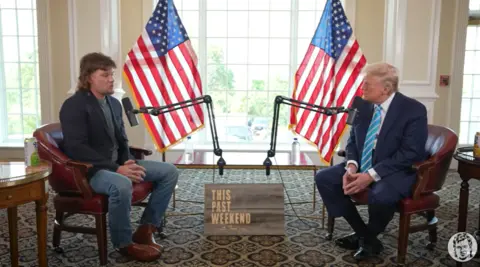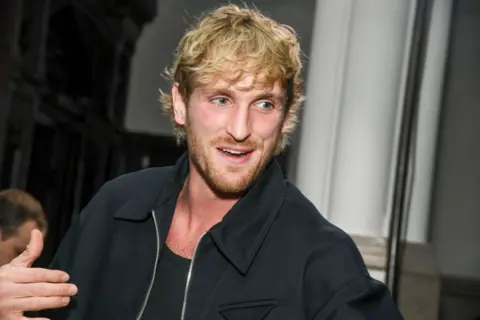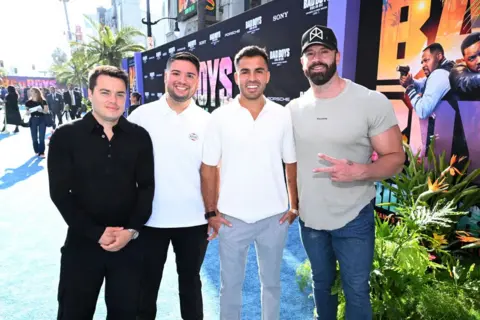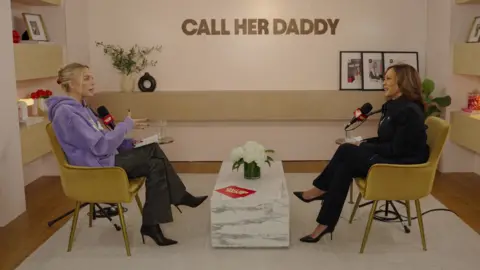'He's just a bro': Trump's attempts to woo the 'manosphere'
 Theo Von / YouTube
Theo Von / YouTubeDonald Trump has appeared on a slew of shows with huge audiences of young men, sitting for interviews with influencers, comedians and podcasters outside the usual political media. What’s his strategy?
About 15 minutes into Donald Trump’s conversation with comedian Theo Von, the chat veered into territory not usually heard in a political speech.
“I had a great brother who taught me a lesson, don’t drink. Don’t drink, and don’t smoke,” the former president said. “I admired so much about him… And he had a problem with alcohol.”
“I’ve been in recovery for most of the past 10 years,” Von replied. “Drugs and alcohol.”
Trump seemed genuinely interested.
“Which is worse?” he asked. The pair went on to chat at length about addiction and the drugs industry.
Politics wasn’t entirely absent - within a few minutes Trump was back alluding to his grievances against the “deep state” and the voting system - but the friendly chat was a prime example of a larger campaign strategy.
Trump has done a series of interviews with podcasters and alternative media that together comprise a concerted effort to reach young men.
Although the tactic isn’t new - for months, stretching back to last year, Trump has been appearing on alternative, male-dominated media outlets with big audiences - it’s taken on a greater importance in the final stages of this election.
In August the Trump campaign told reporters that they are targeting a key group of voters that makes up just over a tenth of the electorate in swing states. They’re mostly younger men, and mostly white, but the group includes more Latinos and Asian-Americans than the general population.
And they believe they can reach these often fickle voters by putting Trump on shows hosted by people like Von, internet pranksters Nelk Boys, YouTuber Logan Paul and Adin Ross, a livestreaming gamer who has repeatedly been banned from sites for violating rules on offensive language.
The Nelk Boys are reportedly spearheading a voter registration drive on behalf of Trump which they hope will reach like-minded audiences.
 Getty Images
Getty ImagesAlthough they may not exactly be household names in the world of mainstream media, these podcasts have audiences of millions. Von’s Trump interview has nearly 14 million views on YouTube.
Polls indicate the political gender gap among young people has widened since Kamala Harris became the Democratic nominee in July. Overall the vice-president seems to be pulling more young people into her camp - but her support among young women has risen faster than her support among young men.
Recent research by the Harvard Youth Poll indicates 70% of women under age 30 support Harris, while 23% plan to vote for Trump. Among men in the same age group, 53% back Harris and 36% support Trump.
Daniel Cox, director of the Survey Center on American Life, part of the conservative American Enterprise Institute think tank, says that the political gender gap mirrors larger social divisions which have left many young men feeling like few politicians are looking out for them.
“Trump is very good at turning things into zero-sum games,” Mr Cox says. “Young men are trying to understand their place in society that is rapidly evolving, as a group they are struggling more academically, they have mental health challenges and rising rates of suicide.
“These are very real concerns and there’s a sense in the political realm that nobody’s advocating for them,” he said.
But Trump’s podcast tour is not so much a question of policy, Mr Cox says, and more about “showing up” and talking with a different style to a different crowd.

- SIMPLE GUIDE: How to win a US election
- EXPLAINER: What Harris or Trump would do in power
- ANALYSIS: What could be the 'October Surprise'?
- FACT-CHECK: Debunking Trump claim about hurricane funds
- POLLS: Who is winning the race for the White House?
- GENDER: Don't mention Trump - how Republicans try to sway women voters
The attempt to switch up the vibe is apparent in his recent podcast interviews, where the mostly relaxed former president leads with chat about golf and mixed martial arts and Maga-world policies - Trump's Make America Great Again slogan that often refers to an America-first approach - are assumed to be good common sense rather than controversial topics to be picked apart and debated.
Before the addiction chat on Von’s show, Trump praised Ultimate Fighting Championship competitors including Dustin Poirier, displaying more than a casual knowledge of the sport.
“Boy, I'll tell you, he's a warrior,” Trump said, “The man he was fighting was tough… as that fight went along, he just got stronger and stronger.”
Von did not push back - and in fact eagerly agreed - when Trump made a host of unsubstantiated and erroneous statements about voting, immigration and the border, including claiming that “hundreds of thousands of murderers” had entered the country.
On the podcast circuit, there’s plenty of messing around, but sometimes the hosts seem awestruck, deferential or even nervous. Before one chat, the Nelk Boys videoed themselves chugging cans of their own-brand boozy seltzer to calm themselves down before Trump walked into the room.
But their audiences aren’t demanding tough questioning or detailed policy positions.
“A lot of young people are not looking for hard news,” says Mr Cox. “Their first interests might be crypto [currency] or video games, and the politics comes later - through the side door, not the front door.”
 Getty Images
Getty ImagesThere are other signs that Trump is making a hard pivot towards male voters - for instance filling the Republican National Convention stage with the likes of musician Kid Rock, wrestler Hulk Hogan and UFC chief executive Dana White, instead of being introduced - like he was at previous conventions - by his daughter, Ivanka.
Judging from the comments on the podcast interviews, many viewers and listeners already back the former president, but getting them out to the polls may be the real challenge.
Voting rates among young people lag behind overall, and young men tend to vote at slightly lower rates than young women.
The Harris campaign is also making a podcast play of its own, aimed at young women. The vice-president recently appeared on the popular sex-and-relationships pod Call Her Daddy, where she too faced less-than-aggressive questioning.
 Reuters
ReutersGarrett, a Logan Paul fan from Houston in his early 20s, runs his own YouTube channel under the name Spy Jay.
He said he finds Paul’s brand - “being a Maverick” - appealing, and before watching the interview he had an overall positive view of Trump, calling him “a patriotic nationalist who wants to restore the country back to an improved state from before”.
“But the persecution he's facing, while there's a relentless intention in the media to rewrite who he is and what he stands for, implies a greater evil at play,” he said. “And that makes me feel more inclined to be open-minded about voting for him.”
Watching Trump on Paul’s podcast - the internet star asked Trump if he’d ever been in a fight - and Trump’s interview with Adin Ross, only confirmed his views, Garrett told the BBC.
Garrett said he thought young Americans were increasingly tuning into politics, and that Trump is tapping into alt-media spaces “like no other candidate has before”.
“So whether it's a good strategy or bad, it is going to reach quite a few of the young folks,” he said.
Responses online to the video have been broadly positive. “No one can convince me Trump isn’t just a bro when it comes down to it” said one, while another read “Love or hate Trump, but he definitely knows how to make an interview entertaining”.
But some experts question whether Trump has much room to grow his voting base among heavily male subcultures, where he has long had support.
“Trump already seems to have captured the manospheric and hypermasculine over-25s, so this is a late stage and rather desperate attempt to become relevant,” said Jack Bratich, a media professor at Rutgers University who studies the male-heavy online spaces known as the “manosphere”.
Extremely online young men were very active during the 2016 election campaign, when political memes and extreme message boards like 4chan burst into prominence, says Bratich.
The situation is very different eight years later, he says, with “no identifiable right-wing youth-based online political movement” getting heavily involved in this year’s contest.
However, he notes there is little risk and potentially large rewards for Trump.
Whether it pays off will depend on convincing young men who don’t tend to get involved in politics to log off and head to the polls.
Like so many other things in this election, plays for younger voters are full of unknowns.

North America correspondent Anthony Zurcher makes sense of the race for the White House in his twice weekly US Election Unspun newsletter. Readers in the UK can sign up here. If you're outside the UK, sign up here.
